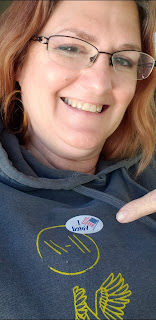Friday Night
I’m gonna smoke all your cigarettes,
Make you go crazy trying to
figure out if I’m really that girl
in the album liner notes
of your favorite band.
You pour your beer in the trash,
refuse to drink the backwash.
But hell, it’s Friday night and
there’s more than leftover beer
in your future and mine.
We think about fooling around,
but the couch is full
of passed out hippies and
covered in cigarette burns,
and shit, it isn’t even our house.
I bum your last smoke
but your lighter is dead.
Kinda like tonight you joke
and I give you a pity laugh.
Karen Cline-Tardiff has been writing as long as she could hold a pen. Her works have appeared in several anthologies and journals, both online and in print. She founded the Aransas County Poetry Society. She has a Kindle book of poetry, Stumbling to Breathe. She is Editor-in-Chief of Gnashing Teeth Publishing.


Comments
Post a Comment